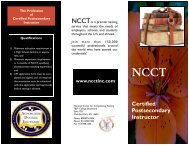P.A.C.E.® Approved COURSE DESCRIPTION - National Center for ...
P.A.C.E.® Approved COURSE DESCRIPTION - National Center for ...
P.A.C.E.® Approved COURSE DESCRIPTION - National Center for ...
Create successful ePaper yourself
Turn your PDF publications into a flip-book with our unique Google optimized e-Paper software.
Family Medical History: About 80% of needle phobic patients say that a firstdegree<br />
relative (parent, child, or sibling) also has needle phobia.<br />
Clinical Findings<br />
o When exposed to a needle, the patient experiences syncope, near<br />
syncope, light-headedness, and/or vertigo along with pallor, nausea, and<br />
sweating.<br />
o Blood pressure or pulse, or both, drop.<br />
o Electrocardiogram shows abnormalities or irregularities of almost any<br />
type.<br />
o There is a rise in stress hormones such as antidiuretic hormone,<br />
dopamine, human growth hormone, catecholamines, corticosteroids,<br />
renin, and beta-endorphin.<br />
Examples of Needle Phobic Individuals<br />
A review of the literature reveals the following examples of self-reported or diagnosed<br />
needle phobic individuals.<br />
1. Patient A, an expectant mother, was permitted by the court to risk the life of her<br />
unborn child by refusing a C-section due to needle phobia. The mother did not<br />
receive IV fluids or pain medication. The delivery was difficult and the baby<br />
suffered serious, but not life-threatening, complications.<br />
2. Patient B loved to travel. He restricted his travel destinations to countries that did<br />
not require vaccinations, as he was terrified of injections. He really would like to<br />
visit South America and Asia but vaccinations are required and he will not<br />
receive them.<br />
3. Patient C is an adult diagnosed with type 1 diabetes that requires twice-daily<br />
injections of insulin. She is not able to manage her disease, as she is terrified of<br />
giving herself the insulin injections. Due to needle phobia, she has serious<br />
health issues that may become life threatening.<br />
4. Patient D has experienced significant pain and developed serious periodontal<br />
disease, resulting in the loss of teeth due to the fear of dental injections.<br />
5. Patient E is a husband and father of two young children. He will not take out a<br />
life insurance policy due to the requirement of blood testing. He is a needle<br />
phobic and will not have his blood collected <strong>for</strong> the required testing.<br />
6. Patient F is a young woman in the military. She would like to become a pilot but<br />
the school requires blood testing prior to entry and, if she were to become a pilot,<br />
she would be required to have annual blood tests. She is working with a<br />
psychologist to overcome her needle phobia so she can advance her position.<br />
Page 6 of 19



